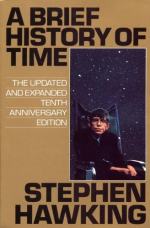
|
| Name: _________________________ | Period: ___________________ |
This quiz consists of 5 multiple choice and 5 short answer questions through Chapter 4 The Uncertainty Principle.
Multiple Choice Questions
1. Aristotle and who believed that time is not absolute?
(a) Newton.
(b) Einstein.
(c) Galileo.
(d) Kapal.
2. In what year did Edwin Hubble discover galaxies outside of our own?
(a) 1954.
(b) 1924.
(c) 1942.
(d) 1934.
3. The idea of the big bang arises from what phenomena?
(a) The decreasing universe.
(b) The theory of light.
(c) The expanding universe.
(d) The theory of relativity.
4. Philosophers try to understand the universe using what method?
(a) Circular arguments.
(b) Religious reasoning.
(c) Mathematics.
(d) Disciplined logic.
5. Unlike children, scientists and philosophers, most adults use what to explain away the fundamental questions of the universe?
(a) Dreams.
(b) Religion.
(c) Common sense.
(d) Logic.
Short Answer Questions
1. Who created the idea that a star can collapse and become a black hole?
2. Hawking is what type of physicist?
3. In order to explain how black holes become a big bang, Hawking needs to include what?
4. Heisenberg and Erwin Shrodinger developed what reformulation of standard mechanics?
5. A black hole has zero what?
|
This section contains 179 words (approx. 1 page at 300 words per page) |

|




